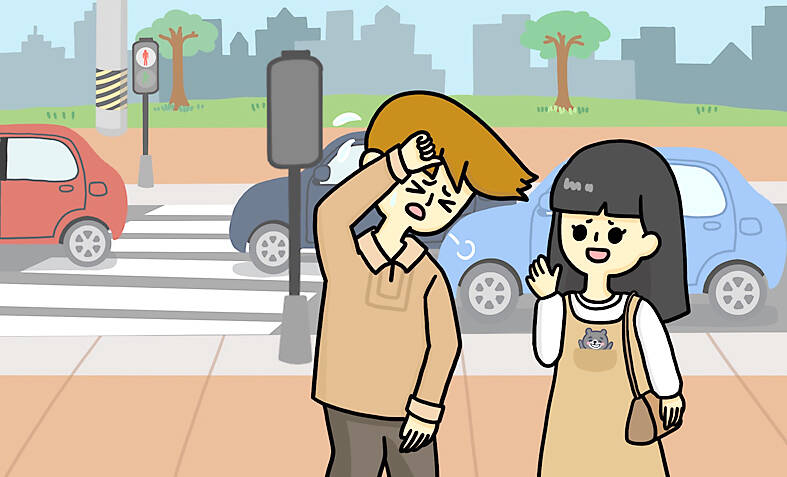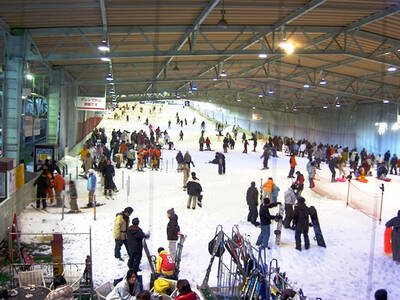對話 Dialogue
小實:馬克,你還好嗎?怎麼這麼喘?
Xiǎoshí: Mǎkè, nǐ hái hǎo ma? Zěnme zhème chuǎn?

馬克:我剛剛想過馬路,但車子開得好急,我只好快跑。
Mǎkè: Wǒ gānggāng xiǎng guò mǎlù, dàn chēzi kāi de hǎo jí, wǒ zhǐhǎo kuài pǎo.
小實:你別擔心,依照法律,車子是要禮讓行人的。
Xiǎoshí: Nǐ bié dānxīn, yīzhào fǎlǜ, chēzi shì yào lǐràng xíngrén de.
馬克:你是說臺灣今年實施的新規定嗎?
Mǎkè: Nǐ shì shuō Táiwān jīnnián shíshī de xīn guīdìng ma?
小實:是啊!今年開始,車子不禮讓行人可能會被罰六千元喔!
Xiǎoshí: Shì a! Jīnnián kāishǐ, chēzi bù lǐràng xíngrén kěnéng huì bèi fá liùqiān yuán ō!
馬克:哇,罰款不少耶,你認為這樣有效嗎?
Mǎkè: Wa, fákuǎn bù shǎo yé, nǐ rènwéi zhèyàng yǒuxiào ma?
小實:我想這能讓大家更重視行人安全。
Xiǎoshí: Wǒ xiǎng zhè néng ràng dàjiā gèng zhòngshì xíngrén ānquán.
馬克:我同意,行人也應該專心走路,不要再滑手機了。
Mǎkè: Wǒ tóngyì, xíngrén yě yīnggāi zhuānxīn zǒulù, búyào zài huá shǒujī le.
小實:沒錯,希望大家都能快樂出門,平安回家!
Xiǎoshí: Méicuò, xīwàng dàjiā dōu néng kuàilè chūmén, píngān huí jiā.
翻譯 Translation
Xiaoshi: Mark, are you okay? Why are you breathing so heavily?
Mark: I was just trying to cross the road, but the car was going so fast that I had to run.
Xiaoshi: Don’t worry, according to the law, car drivers must give way to pedestrians.
Mark: Are you talking about the new regulations implemented in Taiwan this year?
Xiaomi: Yes. Starting this year, drivers that fail to yield to pedestrians may be fined NT$6,000!
Mark: Wow, that’s quite a lot. Do you think this is effective?
Xiaomi: I think this will make everyone pay more attention to pedestrian safety.
Mark: I agree. Pedestrians should also concentrate on walking and stop swiping their phones.
Xiaoshi: Yes, I hope everyone can enjoy going out and return home safely!
單字片語 Vocabulary
1. 喘 (chuǎn) asthma
2. 依照 (yīzhào) according to
3. 法律 (fǎlǜ) law
4. 禮讓 (lǐràng) to give precedence to sb.
5. 行人 (xíngrén) pedestrian
6. 實施 (shíshī) to implement
7. 規定 (guīdìng) regulation
8. 罰款 (fákuǎn) fine
9. 重視 (zhòngshì) to pay attention to
教材音檔 Audio Files
教材影片 Video Files:
https://www.instagram.com/celc.nou_tw/guide/_/17999106352646292/
實踐大學華語中心提供
By Shih Chien University Chinese Language Center: https://chineseusc.com/

For many introverts, shy individuals and people with social anxiety, mingling at parties is often draining or arouses uncomfortable emotions. The internal debate about whether or not to attend large get-togethers can get especially intense during the holiday season, a time when many workplaces celebrate with cocktail hours, gift exchanges and other forms of organized fun. “Some people are just not party people,” City University of New York social work professor Laura MacLeod said. “With a workplace holiday party, there’s a pressure to be very happy and excited. It’s the end of the year, it’s the holidays, we’re all feeling grand.

Facing relentless flooding and rising expenses, Dumble Farm in England has stopped selling milk and started an unexpected but therapeutic venture: cow cuddles. In 2022, the owners sold most of their dairy cows and began letting visitors spend time brushing, petting, and even hugging specially trained Highland cows for 95 pounds per session. This unusual shift reflects the rise of the so-called healing economy, a sector where animal-assisted experiences are marketed as emotional remedies for stress and burnout. While dogs and cats remain the most common therapy animals, cows are gaining popularity for their calm nature. At Dumble Farm, only cows that

Twelve dinner guests have just left your house, and now a tower of greasy plates stares back at you mockingly. Your hands are already wrinkling as you think about scrubbing each dish by hand. This nightmare bothered households for centuries until inventors in the 19th century tried to solve the problem. The first mechanical dishwashers, created in the 1850s, were wooden machines with hand cranks that splashed water over dishes. Unfortunately, these early devices were unreliable and often damaged delicate items. The real breakthrough came in the 1880s thanks to Josephine Cochrane, a wealthy American socialite. According to her own account,

對話 Dialogue 清清:你看到小陳最近發的滑雪照了嗎?看起來真帥氣。 Qīngqing: Nǐ kàndào Xiǎo Chén zuìjìn fā de huáxuě zhào le ma? Kàn qǐlái zhēn shuàiqì. 華華:感覺滑雪很好玩。看了他的照片以後,我在想要不要去學滑雪。 Huáhua: Gǎnjué huáxuě hěn hǎowán. Kàn le tā de zhàopiàn yǐhòu, wǒ zài xiǎng yào bú yào qù xué huáxuě. 清清:我聽說報名滑雪教室的話,會有教練帶你練習。 Qīngqing: Wǒ tīngshuō bàomíng huáxuě jiàoshì de huà, huì yǒu jiàoliàn dài nǐ liànxí. 華華:可是我有點怕摔倒,而且裝備好像不便宜。 Huáhua: Kěshì wǒ yǒudiǎn pà shuāidǎo, érqiě huāngbèi hǎoxiàng bù piányí. 清清:剛開始一定會摔啊,不過可以先上初級課程,比較安全。 Qīngqing: Gāng kāishǐ yídìng huì shuāi a, búguò kěyǐ xiān shàng chūjí kèchéng, bǐjiào ānquán. 華華:說的也是。那你呢?你想不想一起去? Huáhua: Shuō de yěshì. Nà nǐ ne? Nǐ xiǎng bù xiǎng yìqǐ qù? 清清:我想加一!我們可以先找找看哪裡有教練和適合初學者的課程。 Qīngqing: Wǒ xiǎng jiā yī! Wǒmen kěyǐ xiān zhǎo zhǎo kàn nǎlǐ yǒu jiàoliàn hàn shìhé